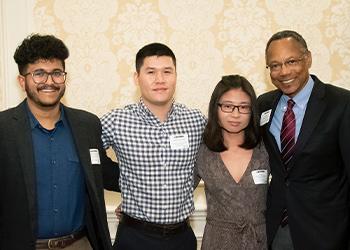
Four senior PhD students in the School of Medicine were awarded the second annual Chancellor’s Award for Research Excellence (CARE) for outstanding accomplishments in basic science research. Ted Espenschied, Nandan Gokhale, Kevin Lin, and Ying Yin were recognized at a ceremony at the Washington Duke Inn, and also received an engraved plaque with a cash award of $1,500.
The students, who were nominated by faculty members from basic science departments in the School of Medicine, were selected by a committee of faculty members on the basis of their publication records and impact on the research trajectory of their labs.
"This year's eighteen CARE nominees all excelled in their respective research endeavors and reflect Duke's high standard of biomedical graduate training,” said Beth Sullivan, PhD, associate professor in the Department of Molecular Genetics and Microbiology and associate dean for research training. “The four recipients particularly stand out for their highly innovative science in key areas of biomedical research, and their strong publication records speak to the paradigm-shifting research they have conducted. While their nominators extolled their independence, focus, and perseverance, I was also impressed by the intellectual leadership they offered to their labs, and the broad impact they have had on their local scientific communities and beyond."
Ted Espenschied completed his PhD in Molecular Genetics and Microbiology in July 2019. Mentored by John Rawls, PhD, associate professor in the Department of Molecular Genetics and Microbiology, Espenschied used zebrafish to define mechanisms by which epithelial cells of the intestine respond to insult. In recently published work, Espenschied demonstrated intestinal epithelial cell shedding (delamination) can be protective, limiting inflammation and death. Through this work, Espenschied also uncovered an evolutionarily conserved role for multidrug resistance (MDR) efflux pumps in preserving intestinal homeostasis.
Nandan Gokhale completed his PhD in Molecular Genetics and Microbiology in September 2019. His advisor was Stacy Horner, PhD, an assistant professor in the Department of Molecular Genetics and Microbiology. For his graduate work, which was funded by an American Heart Association Pre-doctoral Fellowship, Gokhale studied how the RNA modification N6-methyladenosine (m6A) regulates infection by viruses like hepatitis C virus, dengue virus, and Zika virus. His work has revealed that m6A acts directly on viral RNAs to regulate specific stages of infection. He has also identified infection-induced changes in m6A modification of cellular mRNAs which can modulate the function of these RNAs and ultimately impact the outcome of infection. Together, these findings illuminate how m6A dynamically regulates the host response to RNA virus infection and why it matters.
Kevin Lin is a MD/PhD student in the Duke Medical Scientist Training Program. He completed his PhD in pharmacology in 2019 in the lab of Kris Wood, an assistant professor of pharmacology and cancer biology. Lin’s research uses high-throughput functional genomics to define mechanisms of chemotherapeutic resistance and sensitivity in acute myeloid leukemia. His work has contributed to the study of tumor metabolism, chemotherapeutic scheduling, and drug-induced synthetic lethality. He was awarded an NIH F30 National Research Service Award Fellowship and was the recipient of the 2019 Robert and Barbara Bell Basic Science Cancer Research Award. Lin plans to pursue clinical training in internal medicine/medical oncology and hopes to lead a translational laboratory focused on improving pharmacologic management of hematopoietic malignancies.
Ying Yin is a PhD candidate in the lab of Seok-Yong Lee, associate professor of Biochemistry. Her primary research focuses on structural and functional characterization of the cold- and menthol-sensing calcium channel called TRPM8 in humans. Yin has determined the architecture of this ion channel using biochemical approach and single-particle cryo-EM. In the recently published follow-up study, she reported structures of TRPM8 bound to cooling agents and membrane signaling lipid, revealing the ligand binding sites and illustrating the molecular mechanism of TRPM8 activation by cooling compounds.